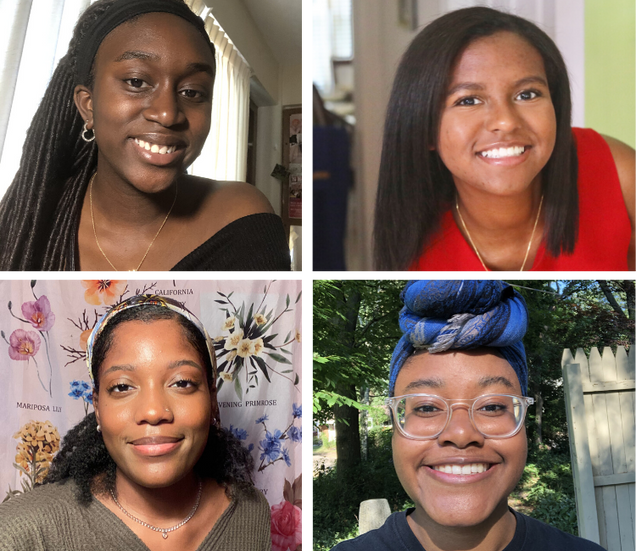#TerrierMade: Age of Advocacy Aims to Serve Womxn of Color as They Transition to High School
In high school, Junia Janvier (CAS’23) was invited to a Women’s Conference where she boldly asked the founder of GirlsWhoCode for advice on serving young womxn of color in her hometown of Providence, Rhode Island. By the time she came to Boston University, she had already piloted a community program and was ready to grow the idea. Since then, she was accepted to the Innovate@BU First-Year Innovation Fellowship program, expanded her team, and established a new framework for her organization, Age of Advocacy.

INNOVATE@BU: How do you create innovation and what problem are you hoping to solve?
JUNIA JANVIER: Age of Advocacy is a program designed to serve young womxn of color during their transition into high school, thus we focus on seventh and eighth-graders.
Our mission is to foster a sisterhood grounded in academic achievement and advocacy. As womxn of color ourselves, we see the need for academic support, especially when transitioning into new environments where we are forced to adjust to the academic and social atmosphere. Many of us attended predominantly white spaces, where we navigated school with intersectional lenses of racial and gender identity. With these lenses, we also recognized all of the changes we wanted to cultivate, but we knew we had to first cultivate that within ourselves.
Tell us, where did the inspiration for Age of Advocacy come from and how did you get started?
Age of Advocacy started out as a question.
My middle school’s current Headmaster had invited several alumni to a Women’s Conference at Bryant University. It was meant to be a networking event with panels and workshops for business owners in the area, so I was really there to learn. The final speaker of the day was Reshma Saujani, the founder of GirlsWhoCode. I nervously asked, in front of everyone, for advice. I said that I wanted to serve young womxn of color in Providence, but wasn’t sure how.
Fast forward, they worked with me on my business plan, and I then did a teaser day of my program. I saw how valuable it is just to have space for young womxn to just be. I knew that I wanted to address academics and advocacy, but I think what makes Age of Advocacy so important is that as a woman of color I know that I need a space to be myself and to talk about what affects me. In middle school, we usually focus on making an impact during our teenage years or in higher education, but if we focus on the period of transition, young womxn would be equipped with the tools to catalyze change immediately.

What has been the biggest challenge or obstacle you had to overcome while getting started?
The biggest challenges have been finding a team, developing our identity, and framework.
I’m really blessed to have such amazing friends, who I am now working with to develop Age of Advocacy. I had to get over this fear of asking for help. Through overcoming that fear, I have a group of womxn who I can really rely on, and have already worked to make the program so much better!
One of the things we’ve worked on specifically is our framework; in terms of the basis of what we’re doing, how to distinguish ourselves, and what goals we aim to achieve. We’re designing our programming to be tailored specifically for our target demographic, in our current research stage, we’re learning how to best understand our base and looking to alternative forms of outreach and story collecting so that we can represent our discoveries in a way that depicts the entirety of our base and mission.
How about your biggest win so far?
The biggest win so far has definitely been developing my team! My team is filled with accomplished and motivated womxn of color who have experience in web design, communication, graphic design, etc.
I am definitely ecstatic to have such an amazing group of friends who really value the mission we’re striving to achieve and the young womxn we wish to serve!

What advice would you give to someone starting their own innovation journey right now?
To someone starting their own innovation journey right now, I definitely would say: understand your workload and seek help when necessary.
I think that sometimes when we come up with an idea, we like to take ownership of it, so then we find ourselves almost afraid to share that with others; however, remember that whatever service you want to provide whether a business, nonprofit, or just a project, the people you intend to serve will most likely want to help you achieve your goal.
Your network can be whatever you make of it, whether that means a support system or even a team. Take advantage of the opportunities provided wherever you are, ask yourself questions about what you’re doing, and you’ll succeed!
What meaningful impact are you hoping to create from this venture? What are you and your team working on to get there?
The most meaningful impact would be us being able to follow the journey of young womxn we’ve served, and ultimately catalyze change and academic success wherever they are.
Our goal is to have womxn of color motivated and excited to ask probing questions, seek encompassing answers, and create viable solutions. We also want young womxn to have the tools and resources to manage their own programs and ventures to create a domino effect of activism. Therefore, our team is working to not only tailor our programming to effectively address our goals, but we also want these young womxn to have the agency to help us craft what they want, so we are working on what our community would like to see.
In fall 2019, Junia was interviewed as part of Innovate@BU’s Voices of Impact series where she shared the origin of her idea.
What resources have been most helpful to you along the way?
Innovate@BU has been an amazing resource! We have been able to connect with experts in the start-up world, while also collaborating with fellow students.
My first experience with Innovate@BU was through the First-Year Innovation Fellowship. I received amazing feedback on my venture and I was able to fully immerse myself in my idea while still being able to achieve academically.
Innovate@BU has also connected with resources outside of campuses such as the Startup Law Clinic and accelerators and fellowships in the Greater Boston Area. BU’s faculty has also been an amazing resource because many of its faculty members do have organizations or programs that focus on similar goals.
Lastly, looking at my community has been really helpful. Providence has a lot of amazing opportunities to get involved and individuals with organizing experiences.
What’s something we might be surprised to know about you?
All of my team members are friends! We typically hang out and explore Boston together.
